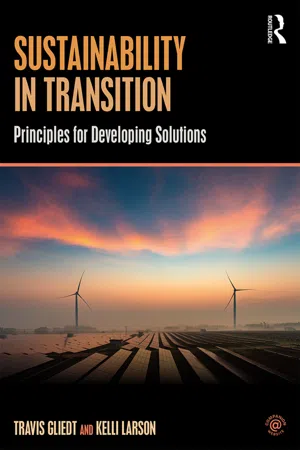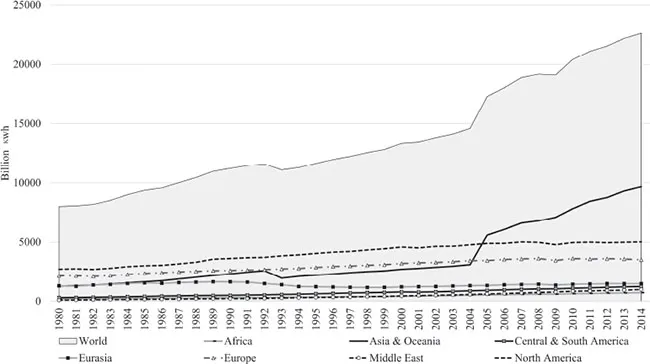![]()
1 Strong sustainability principles and competencies
Learning objectives
• Outline a set of principles that provide a more comprehensive understanding of sustainability than the three pillars perspective
• Describe sub-principles of sustainability that are measurable at the level of energy or water systems
• Discuss competencies of sustainability that form the core of sustainability science
• Build a framework for solutions-oriented sustainability transitions
• Compare strong sustainability pathways containing different sets of strategies and instruments
• Define problem- and project-based learning as a means of achieving sustainability solutions
Origins of sustainability
Humans have always been interested in the environment that surrounds us. From the dawn of time to the end of great civilizations, humans and the natural environment have and will always be coupled. Researchers across a broad spectrum of fields have dedicated their careers to studying these relationships between society and physical systems. In fact, many university departments and government funding institutions around the world now focus their energies on questions related to socio-ecological system functions, and transitions. Yet despite growing academic knowledge and continually accumulating practical experiences of governments, businesses, and civil society, it is abundantly clear that society and the various actors focused on sustainability have failed to formulate and solve a sustainability equation. Reasons for this failure include the inability to agree on what sustainability means and how we should get there, the lack of strategies and instruments necessary to achieve sustainability, and the unwillingness to prioritize sustainability over other societal challenges.
Defining the concept of sustainability has become a politically charged and often futile endeavor. Debate persists as to whether sustainability is a single discipline or an interdisciplinary field or is rather a collection of efforts from multiple disciplines with little coordination between approaches and methods. Sustainability has become a buzzword used by many actors because of its broad appeal, and yet few examples exist to demonstrate multi-level sustainability transitions of coupled physical and human systems that are based on an integrated set of sustainability principles. Rather than making radical system changes, interventions more often focus on politically feasible and cost-effective incremental changes that represent business-as-usual pathways known as weak sustainability. These weak sustainability pathways allow tradeoffs between the economic, social, and environmental components of sustainability. Policies may lead to job creation, business attraction, or public safety improvements that enhance economic and/or social criteria by for example increasing the gross domestic product (GDP) or reducing the number of vehicle deaths. The side effect of these policies is that the performance of environmental criteria may decline by, for example, the destruction of natural capital or an increase in pollution levels associated with producing more human-made capital infrastructure and technologies.
Another major challenge that limits sustainability progress is the gap between the use of systems theory and modelling approaches by physical scientists and the attempts by social scientists and decision-makers to understand and in some cases support governance changes. Closing this gap is necessary to achieve a transition towards sustainability. What types of processes are needed to link science, technology, engineering, and math (STEM) frameworks to social sciences, humanities, anthropology, and political economy (SHAPE) frameworks in order to adjust our place within the world regarding sustainability? Finding a way to balance the positive dimensions (e.g., what the data and models tell us is occurring) with the normative dimensions (e.g., what we believe should occur) of sustainability science is critical to ensuring that the interconnections between systems and how to manage them become clear. Doing so may require a new type of sustainability professional, but what would a sustainability professional look like? What are the necessary skills and competencies that schools of all levels should be teaching? If business leaders seek a competitive advantage from sustainability, what employee characteristics do they look for? If government leaders are interested in the sustainability of their communities and jurisdictions, what decision-making tools and skills would help achieve their goals?
Alternative concepts to sustainability may be easier to measure or more straightforward to achieve, but most give preference to economic or social criteria relative to environmental imperatives. Even when global ecological footprint analyses tell us that we are overshooting our capacity to sustain ourselves, we continue to do so because it is what our systems are designed to do. Science tells us that we are in trouble, and social science attempts to tell us how to get out of trouble. And yet, even our best experts on human behavior and organizational theory are only beginning to establish approaches to help mitigate the challenges of climate change and biodiversity loss, let alone water shortages and food insecurity. One goal for sustainability professionals is to find new ways to convince citizens to solve challenges that are partly of their own making without shaming and blaming them.
Humans are both complex and yet incredibly simple creatures. The simplicity comes from our common desire for things that make us safe, productive, and successful. We know what these things are (e.g., homes, employment, roads, and other infrastructure) and have become effective producers of them. The complexity stems from disagreement on the definition of, and order of preference for, the necessary capabilities to make these things (e.g., human capital, social capital, institutional capital, natural capital). How did we get to a point where tradeoffs are made and accepted between capabilities that can improve safety, productivity, and success? We know now better than at any point in human history how systems function, as well as the impacts of destroying the functions and services provided by systems. However, we still do it, undermining our capabilities to continue to be able to produce things that make us safe, productive, and successful. Addressing this conundrum is the fundamental challenge of sustainability and the focus of this book.
In order to approach solving this puzzle, we must first build a definition and a framework for sustainability. Many countries and their leaders have played key roles in shaping the field of sustainability. From Gro Harlem Brundtland of Norway helping to define sustainable development as development that meets the needs of the present without compromising the ability of future generations to meet their needs, to Angela Merkel of Germany presiding over a sustainability transition based on green innovation, to the various researchers and academics who have worked hand-in-hand with societal actors to define sustainability transition theory through practice in the Netherlands, there is no shortage of sustainability champions in just about every country on earth. While early conceptions of sustainability focused on resource use and depletion, which was often related to population growth or the impact of technology on resource use rates, more recent integrated conceptions center on linking physical systems science and social systems science to recognize constraints (e.g., bio-physical and socio-political) while focusing on solutions (e.g., technology and policy innovation).
Figure 1.1 shows four common frameworks for understanding sustainability. The first (A) is a stool to represent sustainability as balancing economic, social, and environmental interests. This would imply that if one leg of the stool is underperforming, the entire stool may collapse. The second (B) is a pyramid, which suggests that economic and social systems rely on environmental systems for stability. The third (C) is the often-used Venn diagram, which implies that sustainability is achieved by focusing on the central overlapping section. Weak sustainability could be achieved by focusing on the overlap between two of the circles, for example, socio-economic, socio-environmental, or eco-environmental. A drawback of (A) and (C) is that they emphasize tradeoffs between the three pillars. For example, increases in human capital (the social circle) and human-made capital (the economic circle) could accelerate the rate of depletion of natural capital (the environmental circle). While accepting tradeoffs is often necessary to gain agreement from actors including business leaders and politicians who aim to maximize social and economic benefits in the short-term, it implies that each pillar is equal in importance. In contrast, the fourth framework (D) is frequently alluded to by ecological economists and Anthropocene researchers to highlight that economic development is dependent upon the social system, and furthermore, that the socio-economic system is limited by the natural capital and ecosystem services provided by the environment. Framework (D) implies that the environment/natural system is fundamental to the social and economic systems, which most closely aligns with the strong sustainability principles described below.
The challenge for sustainability professionals is to match interventions in the form of strategies and instruments to the goals and targets set by stakeholders in relation to the choice of sustainability framework. How would these frameworks be applied in your town, city, or country? What are some limitations of using these frameworks when trying to explain sustainability to business leaders, politicians, or primary school students? How do changes in global energy or climate systems relate to these frameworks?
Energy system changes: challenges and opportunities for sustainability
Centralized electricity systems have helped facilitate rapid improvements to income and quality of life. Increasing energy demands from industry, the commercial sector, and residential expansion has led to an increase in global electricity production since 1980 by nearly a factor of three (Figure 1.2). North America produced the most annual electricity from 1980 until 2004, at which time economic and population growth in China and India led to rapid increases in the annual production of electricity. Electricity production rates in Europe leveled off between 2006 and 2014 partly due to slowing population growth and an increase in sustainability-oriented policies aimed at energy efficiency and conservation. Electricity production rates in Eurasia declined from 1990 to 1998 partly due to declining economic growth rates in Russia. Central and South America, Africa, and the Middle East are all experiencing slow but steady growth in annual electricity production rates driven by increasing economic and population growth. The impact of the 2008 recession is also evidenced by slight declines in electricity production in North America and Europe, followed by another increase from 2009 to 2014.
When comparing electricity production by fuel type, several tre...






